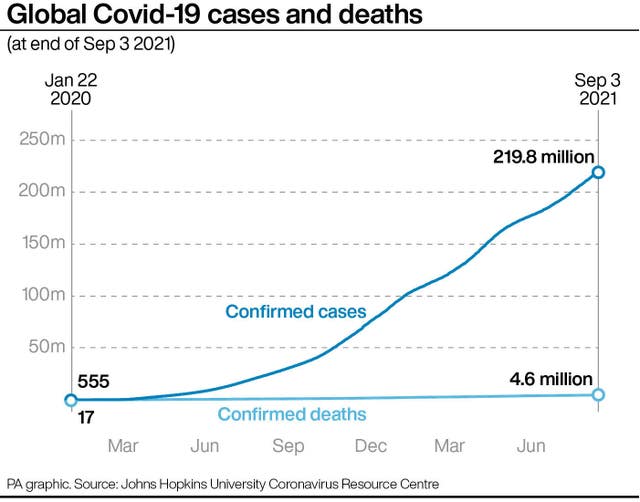
Ali Miraj 12pm - 3pm
4 September 2021, 13:24

The South Pacific archipelagos lack enough oxygen, ICU beds and morgue space.
France’s worst coronavirus outbreak is unfolding 12 times zones away from Paris, devastating Tahiti and other islands of French Polynesia.
The South Pacific archipelagos lack enough oxygen, ICU beds and morgue space – and their vaccination rate is barely half the national average.
Simultaneous outbreaks on remote islands and atolls are straining the ability of local authorities to evacuate patients to the territory’s few hospitals.

Vincent Simon, the head of the regional emergency service, said: “The problem is, there are a lot of deaths before we get there.”
French Polynesia is France’s latest challenge in juggling resources to battle the pandemic in former colonies that stretch around the world.
With more than 2,800 Covid-19 cases per 100,000 inhabitants, it holds the national record for the highest infection rate – and this is only an estimate.
Things are so bad that the multi-ethnic territory of about 300,000 residents stopped counting new infections as local health authorities redeployed medical staff to focus on patient care and vaccination instead of testing.

Of the 463 virus-related deaths reported in French Polynesia throughout the pandemic, most took place over the past month. Vaccine scepticism, high obesity and diabetes rates, and the decision to reopen to some tourists this summer have been among the explanations for the current health crisis.
Tensions have surfaced among other virus-ravaged French territories. While the central government in Paris sent hundreds of health care workers to the French Caribbean over the summer, Polynesia received just 10 backup nurses.
After weeks of pleading by Polynesian officials, the government promised this week to send 100 more.
French Polynesia, whose 118 islands stretch across an area as large as Europe, has broad autonomy from Paris but relies on the central government for health care.

“We need help. We have said it before: we cannot get by without it,” Tony Tekuataoa, the head of emergency services at the French Polynesia Hospital Center in Tahiti, told local television.
More than 330 people are currently in hospital with the virus, including 55 in intensive care – well beyond the territory’s capacity.
There is a lack of beds, mattresses, oxygen cylinders, oxygen concentrators. And with 15 to 20 new deaths per day, funeral directors can no longer meet the demands of families.
Hospital authorities are opening new Covid-19 wards, and all medical and paramedical professionals have been requisitioned.
The regulatory agency dispatches equipment and personnel in a permanent state of emergency.
The surge is taking a toll on the mental health of medics. Meanwhile, disputes over vaccinations are tearing some families apart.

“The caregivers were not prepared to see so many deaths,” said Philippe Dupire, medical director of the French Polynesia Hospital Centre.
The hospital’s workers appealed directly to Macron with a photo shared on its Facebook page showing the lobby where the president made a speech during a July visit and the same lobby a month later – now packed with 20 hospital beds occupied by virus patients.
To curb infections, local authorities imposed a curfew at first, then localised lockdowns, and now they have shut down schools. Obligatory vaccinations have been announced for some sectors, despite objections in certain quarters.
Vaccinations are rising, but eight months into the campaign, only 38% of the total population is fully vaccinated, while 50% have received a first dose. That compares to 67% and 73% nationwide.
Meanwhile, more than 90% of those in intensive care are unvaccinated. A majority of those who have died were also unvaccinated.

The government’s minister for overseas territories, Sebastien Lecornu, blamed the lag on vaccine scepticism in a population particularly sensitive to disinformation.
Distrust of authorities is also an issue among indigenous populations, scarred by the legacy of France’s nuclear tests on Polynesian atolls and decades of efforts over reparations.
Concerned about the potentially deadly consequences of vaccine avoidance, the leader of an independence party appealed to all communities to get the injections and to reject false information shared online.
While infections may be peaking in French Polynesia, experts fear a long, high plateau instead of a quick recovery.
Epidemiologist Jean-Marc Segualin said that “nothing very significant is happening that shows an improvement”.
The territory has one bright spot: Nuku Hiva, in the Marquesas Islands, where French Polynesia’s vaccination campaign began in January and 85% of the population is fully vaccinated.